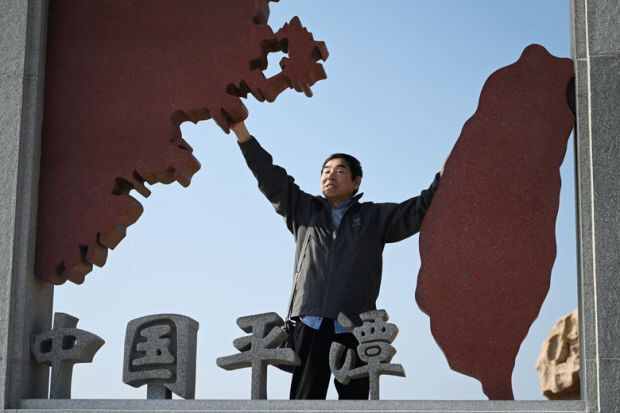
Pingtan Island, Fujian Province - As tensions escalate across the Taiwan Strait, fueled by Beijing's fiery rhetoric against Taiwan's leadership and recent military drills encircling the self-governing island, some Chinese tourists visiting the mainland's closest point to Taiwan have voiced their aspirations for unification.
On a clear Wednesday, April 2nd, at the scenic "68 Nautical Miles" viewpoint on Pingtan Island in Fujian province – the closest land point between mainland China and Taiwan's main island – a man posed for photographs, the distant shores of the democratic entity a tangible presence across the water. (Photo: Hector Retamal/AFP)
Just 130 kilometers (80 miles) away from Taiwan, a picturesque park on Pingtan teemed with tourists, many donning sunglasses and clutching their phones. They strolled to the edge of the cliffs, gazing out at the independently ruled island.
Ye Xianzhen, snapping photos of his wife and young son, told AFP that he had seen news of the military exercises on television and expressed his hope that Taiwan would one day "return to China." "I hope that one day we can take a train directly to Taiwan," he added.
Gao Feng, visiting the park with his wife, peered through a telescope, scrutinizing the nearby rock formations and the sea. The 55-year-old doctor from eastern Anhui province remarked, "I've always heard about this beautiful place. I wanted to see the blue sea, which is rare in China. Being so close to Taiwan evokes many feelings."
For Gao's generation, the narrative of Taiwan coming under Beijing's control has been a familiar refrain since childhood. "The liberation of Taiwan was even written in our elementary school textbooks," he emphasized. "We are one family, and we have always believed that the family should reunite sooner or later."
'Precious Island'
Wang Zhuedan, who traveled with a friend from Yunnan province, echoed the sentiment of having grown up with Taiwan in her thoughts, partly due to some of her favorite TV shows being produced there. "Seeing it in person is quite emotional," the 28-year-old said. "I had only seen Taiwan on TV dramas and in the news before."
She expressed her hope for swift unification, anticipating that "it will be more convenient to travel there."
The Communist Party-ruled mainland has never governed Taiwan, which has been home to indigenous peoples for millennia and has a history of being ruled by the Dutch, Spanish, Qing dynasty, and Japan.
Beijing has threatened to use force to bring Taiwan under its control, a move that would likely extinguish the vibrant democracy and suppress any dissent to Chinese rule.
However, such concerns seemed distant for Wang Quanchu, a retiree who drove nearly 2,000 kilometers (1,240 miles) from Beijing to Pingtan with his wife. He spoke of his dream to revisit Taiwan, a place he had been to twice before. Currently, Taipei restricts visits from mainland Chinese residents.
"When our precious island of Taiwan returns, I want to drive my car all the way to Taiwan," the 71-year-old declared. He added that he and his wife are avid viewers of state media programs on cross-strait relations, keeping them informed on the latest news concerning Taiwan. "I'm confident that it won't be too long before my dream comes true," Wang asserted.
'We Want Peace'
As if to underscore the ongoing military tensions, AFP journalists witnessed fighter jets soaring over the sea from a scenic spot adjacent to a Chinese military base, a stark reminder of the drills being conducted in the waters around Taiwan.
Liu Lili, a local resident visiting her son who studies nearby, also told AFP that she was "looking forward to the day China takes them back." The 50-year-old expressed disdain for some Taiwanese politicians, particularly former President Tsai Ing-wen, accusing them of "eating China's food."
Locals in Pingtan, however, appeared more circumspect. One resident, clad in bright orange overalls and boots while collecting trash by the sea, said she did not believe Beijing would resort to force. The woman, who declined to give her name, indicated that she and other locals kept their distance from anything related to the Chinese military. Pointing towards military installations on a nearby hilltop, she stressed, "The locals definitely want peace."
Further Information:
Pingtan Island: Located in the Fujian province, Pingtan Island holds strategic significance due to its proximity to Taiwan. It has been developed as a tourist destination, offering viewpoints of the Taiwanese coast.
Cross-Strait Relations: These encompass the political, economic, and cultural relations between mainland China and Taiwan. Beijing adheres to the "One-China Principle," viewing Taiwan as a renegade province to be unified, while Taiwan maintains its claim of sovereignty.
People's Liberation Army (PLA): The Chinese military has intensified its military drills in the Taiwan Strait, seen as a form of pressure and a warning against Taiwanese independence efforts.
One-China Principle: This is the diplomatic recognition of the People's Republic of China as the sole legitimate government of China. Under this principle, Taiwan is considered a part of China.
Taiwan's Democratic System: Taiwan operates as a multi-party democracy with free and fair elections, guaranteeing civil liberties such as freedom of speech and assembly, contrasting with mainland China's one-party system.
The sentiments expressed by some mainland tourists on Pingtan Island highlight the complex and often deeply felt perspectives on cross-strait relations. While Beijing continues to exert political and military pressure on Taiwan, the views of ordinary citizens on both sides of the strait are diverse and nuanced, with many on the front lines prioritizing peace and stability.
[Copyright (c) Global Economic Times. All Rights Reserved.]






























